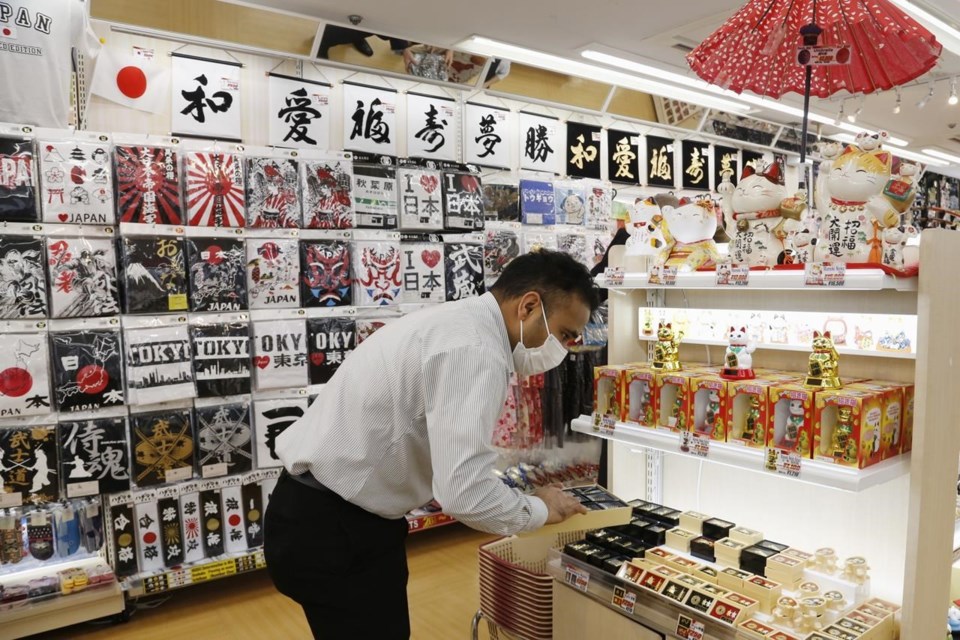TOKYO (AP) — It's hard to tell from his serious demeanor, but Akky International Corp. Chief Executive Hideyuki Abe can barely contain his excitement.
Foreign tourists are coming back, those big-spending visitors from abroad who used to flock into his colorful store in Tokyo’s Akihabara electronics district, its colorful shelves filled with watches and souvenirs like samurai swords and toy cats with bobbing heads.
Individual travelers will be able to visit Japan without visas beginning on Tuesday, just like in pre-COVID-19 times, and electronics stores, airlines and various tourists spots have big hopes for a revival of their businesses.
Japan kept its borders closed to most foreign travelers during much of the pandemic. Only packaged tours have been allowed since June. Meanwhile, the yen has weakened sharply against the dollar, giving some visitors much heftier buying power and making Japan nearly irresistible to bargain hunters.
Abe employs about 50 people and had resorted to layoffs after the pandemic struck in 2020. Some Akihabara shops have closed down since then, but he bided his time.
“Hanging on is where power lies,” Abe said. “Now, I am a bit worried about a shortage of workers.”
Retailers in Akihabara and other businesses in Japan that relied heavily on visitors from all over have had a tough couple years. Major retail chain Laox shuttered its Akihabara store, keeping only its outlets at Narita airport and in the ancient capital of Kyoto open.
The city of Nara, famous for its temples, shrines and sake breweries, is banking on the return of tourists from other parts of Japan along with those from abroad. A pastoral getaway with deer roaming free in parks and glorious autumn foliage, it's a destination recommended for people worried about risks of visiting crowded destinations, said Katsunori Tsuji of Nara Prefecture’s tourism promotion division.
“There are aspects of life that Japanese have preserved over the years in Nara that you can truly sense and enjoy, that spiritual element,” he said.
About 10 years ago, Chinese tourists, visiting in huge groups to snag European luxury brands and even high-tech toilet seats, bought so much their purchases were known as “baku-gai,” combining the Japanese words for “explosive” and “purchase.”
Some 32 million foreign tourists visited Japan in 2019, before the pandemic. The travel and tourism sector then contributed more than 7% to Japan's economy, according to the World Travel & Tourism Council.
Japan’s major carriers All Nippon Airways and Japan Airlines are increasing flights in response to expected higher demand. Both sharply reduced flights during the pandemic.
“The impact incoming visitors have on the Japanese economy is said to be some 5 trillion yen ($35 billion), so we have great hopes about what we can expect,” ANA Chief Executive Shinichi Inoue recently told reporters.
Flights resuming in the months ahead include routes to and from places like Honolulu, Frankfurt, New York, Seoul and Paris. They are meant to appeal not only to incoming tourists but also to Japanese planning dream vacations over the Christmas and New Year’s holidays.
To cater to shoppers from various countries, including places like Vietnam, Europe and the Americas, the staff in Abe's three stores speak more than a dozen languages among them.
He has endured various crises, including the nuclear disaster in Fukushima in March 2011, at a time when the yen was stronger against the dollar, making Japan an ultra-expensive destination.
In 2011, the U.S. dollar cost about 80 yen. Last year, the dollar cost about 111 yen. Now, it’s at a nearly three-decade high of about 145 yen, and the pandemic restrictions are waning. The tourists will be back.
“This time, it’s a perfect opportunity,” Abe said.
___
Yuri Kageyama is on Twitter: https://twitter.com/yurikageyama
Yuri Kageyama, The Associated Press


